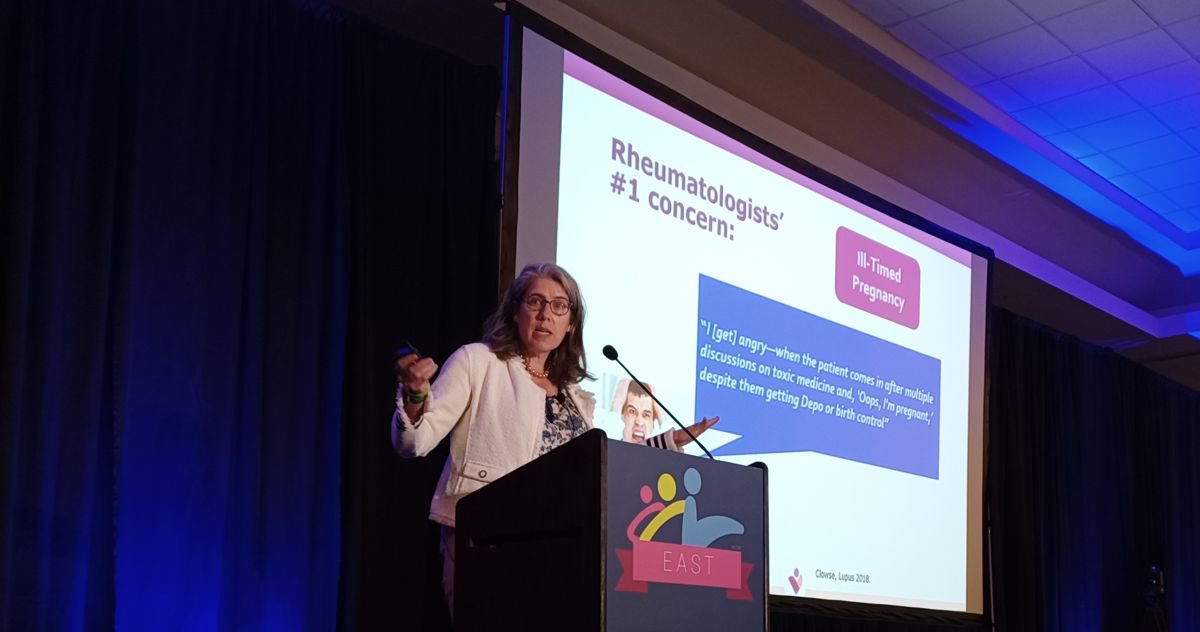DESTIN, Fla. — Ongoing, frank discussions about reproductive health with patients of childbearing age is critical to safe pregnancy outcomes, according to a presenter at the Congress of Clinical Rheumatology East.
“What I have learned is that in order for women with rheumatic diseases to be able to make decisions about medications and pregnancy they need you to be pretty concrete with them,” Megan Clowse, MD, MPH, an associate professor of medicine in the division of rheumatology and immunology at the Duke University School of Medicine, told attendees. “There is a lot of anxiety that surrounds pregnancy and medications and rheumatic disease. Quelling that anxiety is part of our job.”

“The majority of women with rheumatic diseases can have a successful pregnancy,” Megan Clowse, MD, MPH, told attendees. “The key is having disease well controlled with pregnancy compatible medications.” Image: Jason Laday | Healio
That job starts with planning.
“Rheumatologists’ No. 1 concern, the thing that came up time and time again, was ill-timed pregnancies,” Clowse said.
It is important to routinely ask “open-ended questions” of all patients of reproductive age, according to Clowse.
“Ask if she wants to get pregnant,” she said. “Ask what the plan is. Ask about contraception.”
This can help patients avoid unwanted or ill-timed pregnancies and assure safe pregnancies among those who are hoping to have a child in the near future.
Rheumatologists should then include the information from those conversations on the patient’s chart to be shared with reproductive health providers, who may be less familiar with guidelines and recommendations for patients with rheumatoid arthritis or lupus nephritis, and the medications used to treat these conditions.
“We need to help our reproductive health providers know what to do,” she said.
It may also be helpful to consider whether patients are “medically ready” and “personally ready,” according to Clowse. Medically ready means that their disease is well controlled using safe medications, she said. Personally ready, meanwhile, means they are in a position where they could safely and competently undertake parenthood.

Megan Clowse
However, perhaps the most concerning patients, according to Clowse, are those in the middle ground in terms of their personal desire for pregnancy.
“The vast majority of patients are in the ambiguous range,” she said. “They are not actively preventing pregnancy but not trying for pregnancy.”
It is in these patients that unwanted pregnancies can be most common and communication is critical, Clowse added.
The next step is to control disease activity.
“Having well-controlled disease 6 months before pregnancy is the active going rate,” Clowse said.
Although the therapeutic armamentarium in rheumatology continues to grow almost daily, the “good news” is that there are three main medications that are commonly prescribed that are known to cause major birth defects, according to Clowse. These include cyclophosphamide, methotrexate and mycophenolate mofetil.
Of those three drugs, Clowse is least concerned about methotrexate, for one important reason.
“Most rheumatologists are exceptionally careful using methotrexate,” she said.
Cyclophosphamide, meanwhile, is less frequently used than the other two. However, mycophenolate is commonly used and can cause birth defects or anomalies in as many as one-quarter of pregnancies, Clowse said.
“Mycophenolate I consider our biggest problem drug,” she added.
Rheumatologists are encouraged to consult the American College of Rheumatology’s Reproductive Health in Rheumatic Diseases Guideline, along with websites such as lupuspregnancy.org for complete and updated information about medications that are safe for use before, during and after pregnancy.
“The majority of women with rheumatic diseases can have a successful pregnancy,” Clowse said. “Almost all the women I see end up with a healthy baby. The key is having disease well-controlled with pregnancy compatible medications.”
